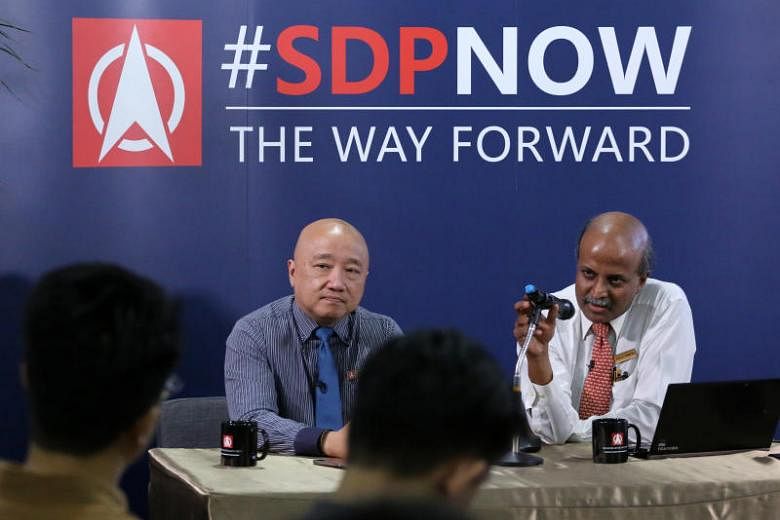SINGAPORE - Calling it an agenda for transformation, the opposition Singapore Democratic Party (SDP) unveiled its policy paper on education on Saturday (July 13), saying it would prepare the nation for a globalised 21st century that is increasingly demanding creativity and innovation, and that it also would address widening inequality in Singapore.
Some of the proposals of the paper, presented by SDP chairman Paul Tambyah and party member Benjamin Pwee at the party's headquarters in Ang Mo Kio, are to reduce class sizes from 40 to 20 and have teachers stay with the same pupils over a few years.
Mr Pwee, who resigned as secretary-general of the Democratic Progressive Party earlier this year to join the SDP, said: "The (People Action Party's) education policy fails to provide that kind of managers and leaders that we need for a knowledge driven economy. Yes, we may have people like that, but are they like that because of the system or in spite of it?"
The education policy paper follows previous papers launched by the party since the start of this year, on topics such as housing and population.
These policy papers will be compiled to form the party's manifesto when it comes time for the elections, said SDP secretary-general Chee Soon Juan.
Dr Tambyah said: "You can be certain that SDP will not allow the government to use the education system to perpetuate the narrow elitism... based on a distorted idea of what constitutes merit."
Among the multiple proposals in the paper, spanning pre-school to tertiary levels, is one to reduce class sizes in primary and secondary schools to 20 students each, so that each child would get more individual attention. The smaller number of students will also reduce the administrative work, freeing up teachers to concentrate on teaching, the paper said.
Another proposal was to assign a teacher to a class and take it through Primary 1 to 3, before another teacher is assigned through Primary 4 to 6.
"Under the current system, students are taught by different teachers every year. This makes it difficult for teachers to take a longer-term approach to helping students capitalise on their strengths and overcome/minimise their weaknesses," said the paper.
Other suggestions by the party included ensuring that a student's financial background would not impede his or her education, through the introduction of interest-free student loans for all undergraduates. The policy paper also called for the government to take over and centralise the provision of special education services.
The issue of smaller class sizes was raised in Parliament last year, and the Education Ministry said then that while it is a popular idea, it was cautious about the issue. Studies, such as one in 2009 in Hong Kong of 700 primary school classes, showed no significant link between class size and achievement, it was highlighted. It was also pointed out that students here no longer study in a fixed class, and "regularly move around, join different groups and there is no single class size".
Speaking to the media after the presentation, secretary-general Chee Soon Juan said the opposition parties are still in discussions over forming an alliance to contest the next general election, which has to be held by April 2021.
Responding to a question from The Straits Times, he said the parties were all "cognisant" of the fact that they must streamline their messages and project a spirit of unity.
He said there are multiple factors as to whether an alliance will be formed, but expressed confidence they can be addressed as long as the parties maintain communication and discussion.
"The thing is to, I suppose, just make sure that everybody is on the same page, whether it's on policy basis or in operations," he said, adding that the opposition parties would also have to decide how to split the constituencies to contest, among the various parties and their candidates.


